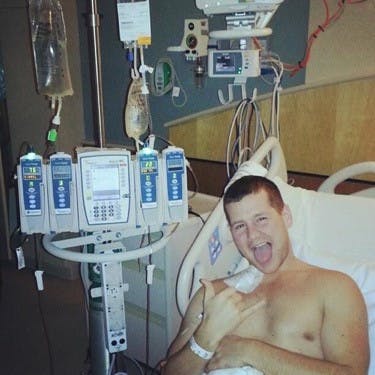By Paris Garnier
At 24, Macklin Swinney was an outgoing and robust young man. He’d graduated from Ben Davis High School, but decided to forego college and start working. He loved partying, especially in Bloomington, Ind. and being outdoors at Dale Hollow Reservoir in Tennessee.
“He was always the heart of the party, and I mean that almost quite literally. Because every holiday, you know, Thanksgiving, Easter, Christmas, Macklin being around was just what made it fun, in my opinion,” Madison Swinney, Macklin’s younger sister, said. She’s currently a sophomore at IU and just turned 20.
Everything was just about fine for Macklin, save for the mole on his back his father insisted he get checked out. He dragged his feet, but eventually went to the dermatologist. The mole was removed and sent for biopsy.
On June 4, 2010, just a month after his 24th birthday, Macklin got the biopsy results.
He had stage 3 melanoma.
Macklin was not alone in his diagnosis. The current statistic from the American Academy of Dermatology (AAD) is that one in five Americans will develop some form of skin cancer. Those with lighter complexions are especially vulnerable, but all shades of skin color are at risk.
May is Melanoma Awareness Month, with the first Monday designated as “Melanoma Monday” by the AAD. This kicks off free skin cancer screenings across the nation, including at IUPUI. Free screenings courtesy of the AAD are available at three campus locations from 7-9 a.m. on May 1. Appointments are necessary; the number to call is (317) 916-3525.

Patients are given a non-invasive examination by an all-volunteer groups of doctors and clinicians. Biopsies are not performed, but patients with irregularities are informed and encouraged to seek an appointment with a dermatologist. Those with clean bills of health are sent on their way with educational materials.
“Just a good set of eyes looking at you can pick up most skin cancers,” Dr. Darrell Rigel, a former president of the AAD and practicing dermatologist, said. He was a part of Melanoma Monday’s creation in 1985. “It’s real simple, it’s painless, it just takes a couple minutes, and it’s very worthwhile.”
Alongside the screening campaign came the ABCDs (now ABDCE) of melanoma. Asymmetry, an irregular border, uneven color, a diameter greater than a quarter inch, and evolution of a mole indicate melanoma. This is how Macklin’s father knew what to watch out for with his son’s skin.
Madison remembers little of the day her brother was diagnosed, just being stunned in the doctor’s office. Her heart races when she thinks back on it. A ripple went through her family. Her father in particular was angry that Macklin had waited so long to see a doctor. Then sadness settled in. But they rallied.
“He was very driven to beat the cancer, and he did at first,” Madison said. Macklin injected himself with the cancer drug Interferon twice a day until July 2011. He was in total remission by 2012.

So Macklin’s life restarted. He went back to work and started partying again after another brief illness. He advocated for self-positivity. In 2013, he returned to Dale Hollow and injured himself while cliff diving. That trip to the doctor revealed a tumor in his chest.
His cancer had metastasized throughout his body and was at stage 4. It was everywhere, even in his bones. He was given between six months and a year to live.
Macklin was scared, but he wanted to fight the cancer again. He participated in an experimental treatment that had a high success rate. Macklin found comfort in religion and embraced Catholicism; he even gave up fear for Lent.
But things fell apart soon after, and Macklin and his family gave up on medicine. It was about managing his pain and keeping Macklin comfortable while he was in hospice at his grandmother’s house. He slept a lot, but was never without company.
“Macklin, he went from being this really healthy, well-toned, active brother to honestly skin and bones. And he was always tired but he tried to keep his spirits up,” Madison said. “He always seemed excited to see us and talk to us. Let us know he loved us and he was still Mack, even though he didn’t really look or act like Mack.”
Macklin died on April 18, 2014, at 27 years old.
He wasn’t alone in this either; it’s estimated that one American dies of skin cancer every hour. In Melanoma Monday’s 32 years, about three million people have been screened, and at least 10,000 cancerous moles have been detected.
“If you can avoid the pain Mack went through and the loss we went through, losing your loved ones, if it’s avoidable, avoid it,” Madison said.
May 1 is Melanoma Monday

Heads up! This article was imported from a previous version of The Campus Citizen. If you notice any issues, please let us know.
A ticket for the Macklin Swinney Benefit Show, put on by his family to pay for his medical bills during his first diagnosis. (Image courtesy of Madison Swinney)
Macklin receiving treatment. The original Instagram caption read "For all of you who feel bad for me just look at this pic. I feel it portrays exactly how my soul feels even if my body doesn't feel so great." (Image courtesy of Madison Swinney)




